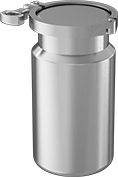Plastic Bottles for Harsh Chemicals

Our most chemical-resistant plastic bottles.
PTFE and FEP bottles are more durable than fluorinated HDPE bottles. They won’t break down or leach contaminants, even when storing acetone, nitric acid, or other aggressive solvents. They’re often used for applications where purity is essential.
Capacity | Mouth | Lid | Each | |||||||||||
|---|---|---|---|---|---|---|---|---|---|---|---|---|---|---|
| fl. oz. | ml | Dia. | Ht. | OD | ID | Color | Type | Material | Color | Autoclavable | Max. Temp., °F | Each | ||
PTFE Plastic | ||||||||||||||
| A | 0.84 | 25 | 1 1/4" | 2 3/8" | 7/8" | 3/4" | White | Threaded | PTFE Plastic | White | Yes | 500° | 0000000 | 000000 |
Quick-Clamp Stainless Steel Bottles

Fill these air-and liquid-tight bottles directly from your line to store, test, and ship liquids. Connect to a quick-clamp fitting (also known as tri-clamp) with the included seal and clamp to fill, then secure the contents with the lid. Bottles are 316L stainless steel, which is easy to clean and does not react to the acids and alkalies in food, or chemicals such as sulfuric acid. The extra-smooth interior is polished to prevent product buildup and inhibit bacteria growth. These bottles are engraved with lot numbers for traceability and include a material test report.
Bottles with a capacity up to 3.8 fl. oz., also known as stability bottles, are often used to test pharmaceuticals, chemicals, and beverages for changes over time.
| Capacity | Dia. | Ht. | Flange OD | For Tube OD | Interior Smoothness, Ra | Seal Material | Autoclavable | Passivation | Certification | Each | |
316L Stainless Steel Bottle and Lid | |||||||||||
|---|---|---|---|---|---|---|---|---|---|---|---|
| 0.85 fl. oz. / 25 ml | 2" | 2 1/2" | 1.984" | 1 1/2" | 10 | Silicone Rubber | Yes | Not Passivated | Material Certificate with Traceable Lot Number and Test Report | 0000000 | 0000000 |
Density Testing Flasks

Accurately measure the density of a liquid based on volume and weight. Also known as pycnometers, these flasks help you compare the specific gravity of a liquid to water. They’re often used for quality control in labs for food and beverage, pharmaceutical, or chemical manufacturing. Made from borosilicate glass, these flasks resist chemicals and won’t expand or contract from temperature changes. Use the included non-mercury thermometer to check the temperature of your sample—it's tested for accuracy, has small increments for precision, and is safe for shipping and handling. You can place these flasks in a constant temperature bath to control the temperature of the liquids inside.
To find the specific gravity of a liquid, divide the weight of the testing liquid by the weight of water at the same temperature.
Mouth | Thermometer | ||||||||||||
|---|---|---|---|---|---|---|---|---|---|---|---|---|---|
| Cap., ml | Dia. | Ht. | OD | ID | Color | Max. Temp., °F | Autoclavable | Includes | For Stem Lg. | Graduation Marks, °C | Temp. Range, °C | Each | |
Borosilicate Glass | |||||||||||||
| 25 | 1 5/8" | 6 7/8" | 5/8" | 3/8" | Clear | 930° | Yes | Thermometer | 1 1/16" | 0.2° | 14° to 38° | 0000000 | 0000000 |


























